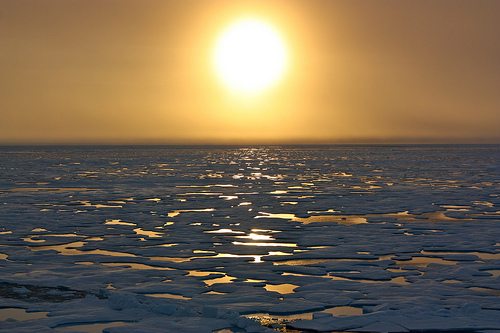

Economy
Controversy over methane ‘time bomb’ in melting Arctic
Climate scientists have come forward to dispute claims that methane trapped beneath the Arctic Ocean could suddenly escape, causing extremely costly global damage.
In a study published in the scientific journal Nature last week, researchers said the release of a single “pulse” of methane from permafrost beneath the East Siberian Sea could cost $60 trillion (£39 trillion) alone.
However, the research has provoked a scientific controversy. Gavin Schmidt, climate scientist at the NASA Goddard Institute for Space Studies, took to Twitter to say the study was “misleading” and assumed an “unlikely” rapid increase in methane emissions.
The study, by researchers from the UK and the US, says a 50 gigatonne pulse of methane could be released between 2015 and 2025. As methane is 20 times more effective at trapping heat as carbon dioxide, the study claims this would accelerate global warming by anywhere between 15 to 35 years.
This would then set off an “economic timebomb” as extreme weather conditions would affect global agricultural production and batter developing economies.
However David Archer, a climate scientist from the University of Chicago, said that there was not a proposed mechanism that would release large quantities of methane gas from the sea floor to the atmosphere quickly enough to cause the kind of damage predicted in the study.
“It has to be released within a few years to have much impact on climate, but the mechanisms for release operate on time scales of centuries and longer,” Archer told Live Science.
In a 2008 report, the US Climate Change Science Programme also said that such a release appears “very unlikely.”
Peter Wadhams, one of the scientists who worked on the original study, has defended the findings, claiming that sceptics are not working from the latest information.
“The mechanism which is causing the observed mass of rising methane plumes in the East Siberian Sea is itself unprecedented and the scientists who dismissed the idea of extensive methane release in earlier research were simply not aware of the new mechanism that is causing it”, he said.
“Therefore I robustly defend our research and commentary, and hope that rather than dismiss the substantial risk such a methane release poses, the response might be to support more intensive research on this problem.”
Further reading:
Arctic ice melt forces Russian scientists to abandon research station
Melting Arctic could cost economy trillions – as well as being environmentally catastrophic
Arctic ice reaches record low, with more melting expected
Comprehensive study shows extent of ice loss increase
Pursuit of Arctic oil is “profoundly reckless”


 Environment12 months ago
Environment12 months agoAre Polymer Banknotes: an Eco-Friendly Trend or a Groundswell?

 Features11 months ago
Features11 months agoEco-Friendly Cryptocurrencies: Sustainable Investment Choices

 Features12 months ago
Features12 months agoEco-Friendly Crypto Traders Must Find the Right Exchange

 Energy11 months ago
Energy11 months agoThe Growing Role of Solar Panels in Ireland’s Energy Future





























